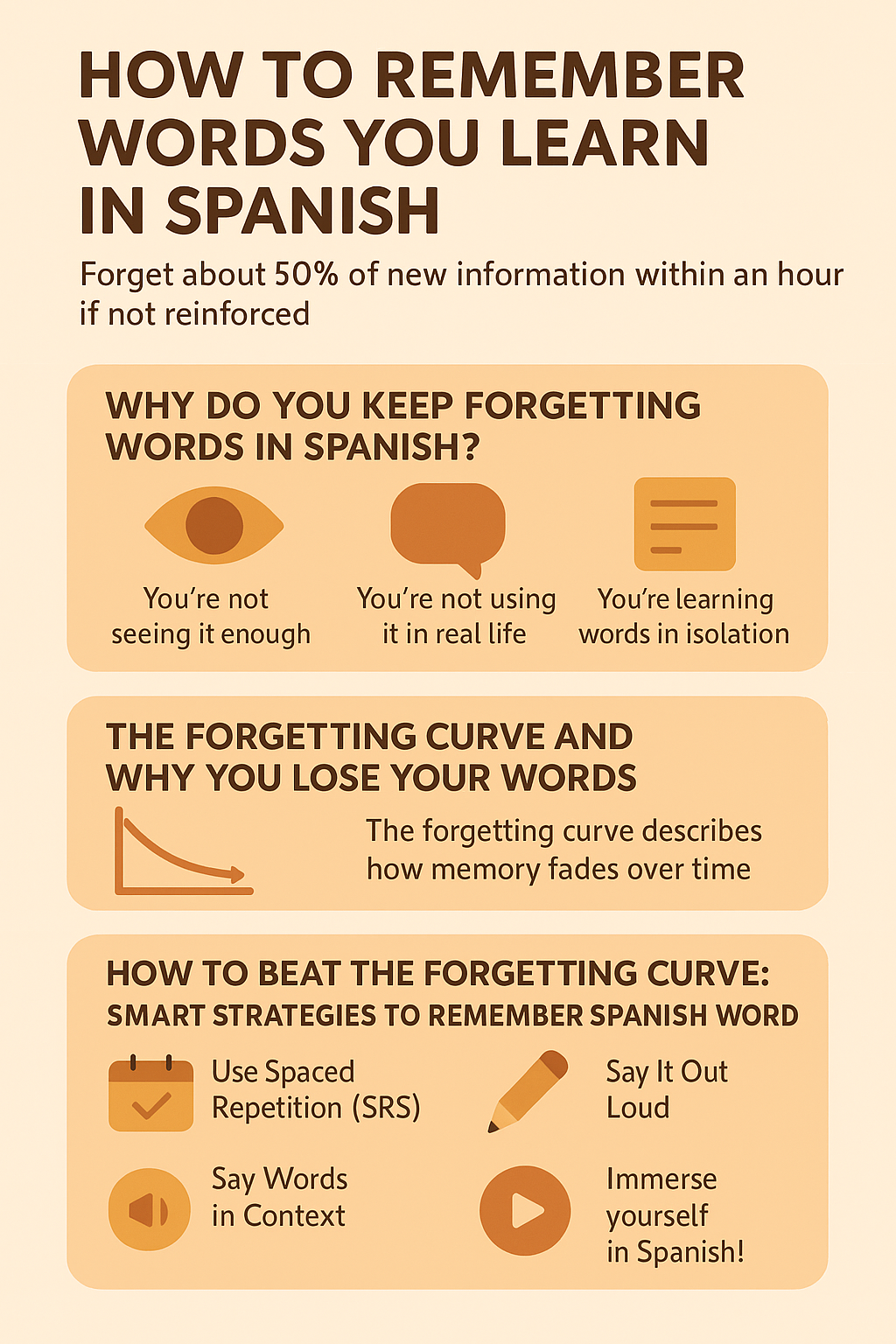How to Remember Words You Learn in Spanish?
If you are you are probably looking for the solution to this problem. You study the word, you repeat it a few times, and you know its meaning but in the moment of action, the moment you finally say it, it's gone. How frustrating it is, isn´t it? Is our brain not working correctly? Am I bad for languages? Maybe questions like those stumble into your head when you experience a similar situation.
In today’s post, we will explain why this happens more often than you think and how can we remember words in another language.
Why do you keep forgetting words in Spanish?
Before we dive into how to remember words, let’s talk about why we forget them in the first place. Why do we sometimes forget words we already know the meaning of?
It’s important to point out, this isn’t just happening to you, and it’s not just with Spanish. Forgetting vocabulary is actually a very common part of learning any foreign language.
3 big reasons why you forget words
- You’re not seeing it enough: One quick look isn’t enough to lock a word into your memory. Our brains must see it multiple times and in different situations to make it stick.
- You’re not using it in real life: If you’re not saying, writing, or hearing the word in real conversations, your brain decides it’s not important, and lets it go.
- You’re learning words in isolation: Random word lists might seem helpful, but without context or connection, they’re hard to remember. Our brains love stories, emotions, and meaningful links, so give those new words a reason to stay!
You're trying to cram instead of truly learning: Picking up 50 new words in one day might feel like you're making progress, but without regular review, most of them will slip away within a week. It all comes down to something called the forgetting curve.
The forgetting curve is what will tell you that your brain is not broken, it’s actually working as everybody else.
The forgetting curve and why you lose your words
In 1885, the German psychologist Hermann Ebbinghaus proposed the theory of the Forgetting Curve, which explains how our memory works when we’re exposed to new information. Basically, it tells us that we forget about 50% of new information within an hour if we don’t reinforce it in some way.
After that first hour, the forgetting curve isn’t as steep, but the memory still continues to decline gradually eventually, we may lose around 80% of what we learned.
This happens due to several factors: how relevant the information feels to you, your state of mind (like if you’re under a lot of stress), and how the information is presented. It’s not the same to learn something complex and messy versus something that’s clearly organized and easy to follow.
That’s why just seeing new vocabulary once isn’t enough to really learn it. But no worries! thankfully, Hermann figured this out, and now we have tools and strategies to fix it!
How to beat the forgetting curve: Smart strategies to remember Spanish words
Use Spaced Repetition (SRS): Instead of reviewing words at random, space out your practice. Apps like Anki or Quizlet are designed to remind you of words just before you’re likely to forget them. That timing helps lock new vocab into your long-term memory.
Put Words in Context: Don’t just learn that gato means “cat.” Use it in a sentence like Mi gato duerme todo el día. The more personal, funny, or vivid the sentence, the more likely you are to remember it.
Say It Out Loud: Speaking engages your brain in a different way than just reading. Try saying words out loud or repeating after native speakers (this technique is called “shadowing”). It boosts both memory and pronunciation.
Add Emotion: Emotions help memories stick. When you learn a word like abuela (grandmother), think of your grandma, or picture a scene from a movie with a sweet abuelita. Tying feelings to words makes them way more memorable.

BONUS TIP: Immerse yourself in Spanish!
Want to make words unforgettable? Surround yourself with Spanish every day. Read, listen to, and watch content that matches your level so you naturally see and hear vocabulary in action. The more you immerse yourself, the less you’ll need to “study” words, they’ll start to stick on their own.
All that being said, remember, you’re not struggling alone, and you’re definitely not “dumb” or anything negative you might think about yourself. The issue is so real, there’s even a theory that explains how quickly we forget things over time.
The good news? Like most challenges in life, this one has solutions! I hope today’s post helped you discover a few of them.
Did you already know about the forgetting curve? Was this helpful? We’d love to hear your thoughts, drop them in the comments!


